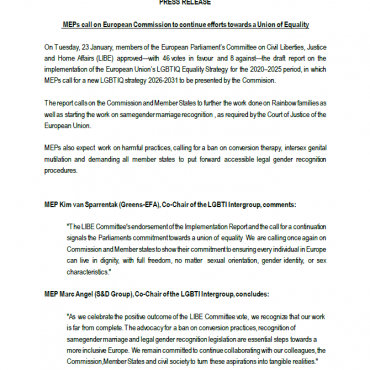LGBTI activists from the Western Balkans and Turkey visit European Parliament
On 16 and 17 January, the LGBTI Intergroup welcomed 6 LGBTI activists from the Western Balkans and Tur key in the European Parliament in Strasbourg, as part of a study visit of various European institutions organised by ERA-LGBTI.
key in the European Parliament in Strasbourg, as part of a study visit of various European institutions organised by ERA-LGBTI.
Biljana Ginova from Macedonia, Danijel Kalezić from Montenegro, Damla Umut Uzun from Turkey, Filip Kocevski from Serbia, Kristian Randjelović from Serbia and Amarildo Fecanji from ERA comprised the delegation of activists.
“We are strong supporters of ERA-LGBTI and the important work they do for LGBTI people in the Western Balkans and Turkey” said Julie Ward, member of the LGBTI Intergroup. “Meeting with and hearing perspectives from LGBTI activists from across the world is an important part of our work with the LGBTI Intergroup. We do this by inviting representatives from the LGBTI community to address us in the European Parliament and also by attending Pride events in places where rights are under attack.”
Activists gave updates on the current situation concerning the rights of lesbian, gay, bisexual, trans and intersex persons in the Western Balkans and Turkey region, while ERA-LGBTI and the World Bank introduced their recent survey on the lived experiences of LGBTI persons in Southeastern Europe. The survey reveals a distressing situation of discrimination, exclusion, mistrust towards institutions and lack of crucial legal protections and services for LGBTI persons. One of the most concerning findings of the survey is that out of all the LGBTI people who have suffered violence in the recent years, only 17% of the cases have been reported to the police, revealing the huge mistrust and fear that LGBTI persons have towards state institutions.
In all 6 countries of the Western Balkans, which are not yet in the European Union, LGBTI people cannot legally enter into same-sex unions or marriage. Trans persons cannot legally change their gender. In countries where they do, they are still required to go through discriminatory and/or intrusive procedures. Even in the case of Serbia, where a much better legal framework was recently provided for gender reassignment, some of the procedures remain discriminatory and intrusive, and some institutions within the medical establishment are perceived to hold monopoly on some crucial procedures related to full legal change of a person’s gender.
“LGBTI people in Southeastern Europe face specific difficulties that need to be taken into account in policies at the national and European level.” said Terry Reintke, co-chair of the LGBTI Intergroup. “The report on LGBTI rights in Southeastern Europe they recently published is key to creating policies that reflect the needs of this specific context.”
The 6 LGBTI activists and ERA-LGBTI pointed out the crucial role of international organisations and the international community in the struggle for more equality of LGBTI persons in the Western Balkans and Turkey. LGBTI rights have gained significant importance in the international community in the last years, which has also contributed to legal advancement of such rights in countries like those in the Western Balkans, where these rights are still widely contested by the general public, state institutions and politicians.
“Maintaining and increasing political will for LGBTI rights in the region is important, not only for EU accession but for building modern, solidary and inclusive societies. Because LGBTI rights are human rights.” said Tanja Fajon, vice-president of the LGBTI Intergroup.
Activists also highlighted that most countries of the Western Balkans are in the process of introducing important legal and policy changes that benefit LGBTI persons. However, these processes are challenging, as all countries require more awareness, resources, expertise and even more importantly political will to introduce these changes. Therefore, dialogue, cooperation and continuous exchange between such institutions, governments and LGBTI organisations operating in the region is important for human rights standards of LGBTI persons to be preserved and advanced.
Read more:
- full report on the event & study visit on ERA-LGBTI’s website






